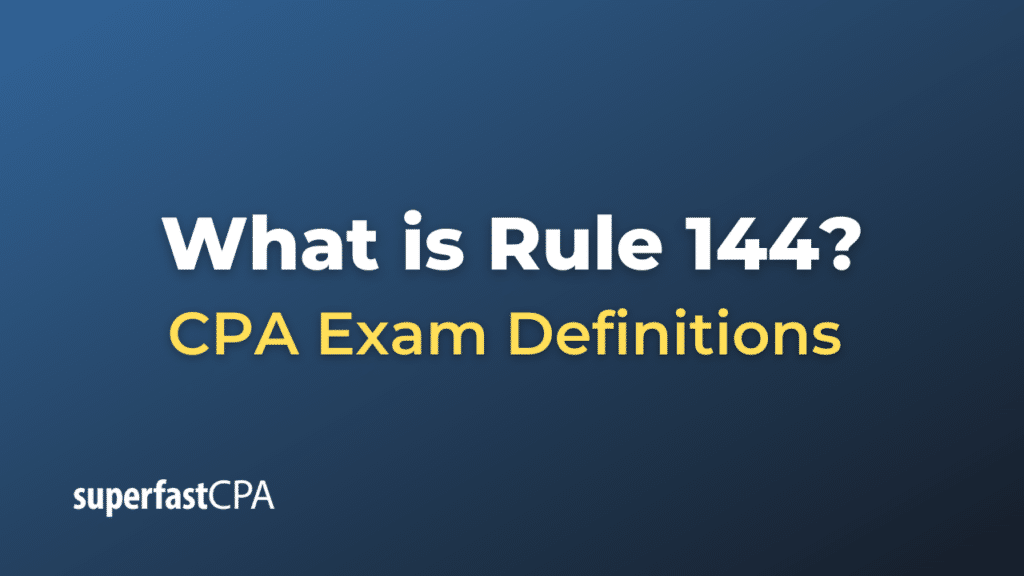Rule 144
Rule 144 is a regulation enforced by the U.S. Securities and Exchange Commission (SEC) that sets forth the conditions under which restricted, unregistered, and control securities can be sold or resold. It provides a public resale exemption for these types of securities if specific conditions are met, allowing holders to sell them in the public market without registering them with the SEC, which can be a complex and costly process.
Here are the main components and conditions of Rule 144:
- Holding Period: One of the most notable conditions is the holding period. As of my last update in September 2021:
- For reporting companies (those that are subject to the reporting requirements of the Securities Exchange Act of 1934), the holding period for restricted securities is six months.
- For non-reporting companies, the holding period is one year.
- Current Public Information: There must be adequate current public information available about the company, which generally means the company has complied with its periodic reporting requirements.
- Trading Volume Formula: If the selling party is an affiliate (or was an affiliate within the past three months) of the issuer, they can only sell within certain volume limits during any three-month period. This is often set to a maximum of 1% of the outstanding shares of the same class being sold.
- Ordinary Brokerage Transactions: Sales must be made in unsolicited brokerage transactions, or to market makers.
- Filing a Form 144 : If an affiliate’s sale exceeds 5,000 shares or has an aggregate sales price greater than $50,000 over a three-month period, they must file a notice with the SEC on Form 144.
- “Affiliate” Status: Rule 144 differentiates between those who are affiliates of the issuing company (insiders, officers, directors, or significant shareholders) and those who are not. Affiliates have more restrictions on the resale of securities compared to non-affiliates.
After the conditions of Rule 144 have been met, non-affiliates are generally free to sell the securities without restrictions, while affiliates must always comply with the volume limits and other conditions of Rule 144.
The Rule is especially useful for employees of companies who receive stock as part of their compensation and for investors in private companies that go public, as it provides a legal method to sell their shares in the public market.
Example of Rule 144
Let’s delve into a hypothetical scenario to better understand Rule 144 and its implications:
Jasmine received 10,000 shares of ABC Tech Inc., a privately-held tech startup, as part of her compensation for an advisory role she took with the company two years ago. These shares are “restricted securities” because they were acquired in a private transaction.
Now, ABC Tech Inc. has recently gone public, and its shares are trading on a stock exchange. Jasmine believes it’s a good time to cash out some of her shares. However, since her shares are not registered with the SEC, she needs to find a way to sell them legally.
Application of Rule 144:
- Holding Period : Jasmine has held her shares for two years, which exceeds both the six-month holding period required for reporting companies and the one-year period for non-reporting companies. So, she satisfies the holding period condition.
- Current Public Information: ABC Tech Inc., now being a publicly-traded company, has been regularly filing its quarterly and annual reports. Thus, there’s adequate current public information available.
- Trading Volume Formula : Since Jasmine isn’t an officer, director, or a significant shareholder (an affiliate) of ABC Tech Inc., she doesn’t have to worry about the volume restrictions of her sale.
- Filing a Form 144: Again, since Jasmine isn’t an affiliate, she doesn’t need to file this form with the SEC, regardless of the number of shares she sells.
Given these circumstances, Jasmine can sell her shares under Rule 144 without needing to register them. She contacts her broker, provides the necessary documentation, and proceeds to sell her shares on the public market.
This example illustrates how Rule 144 can be beneficial for individuals who acquire shares in private transactions and then seek to sell them once the company goes public. By complying with Rule 144, Jasmine can legally and smoothly sell her shares in the open market.













